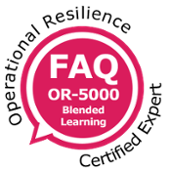Level of Expertise [ORA]
Operational Resilience Audit Learning Roadmap
Operational Resilience Audit Certification Level Vs Expertise Level and Competency Level
Operational Resilience Audit Competency Level Vs Training Requirement
Linking closely to the Operational Resilience Body of Knowledge or OR BoK, there are two building blocks to support our participants' learning journey.
One is the Competency Level or CL, and the other is the Level of Expertise or Expertise Level.
Expertise Level
 All training syllabi within BCM Institute have been designed to assist professionals in upgrading their competency using the "Know", "Do", and "Manage" level of expertise.
All training syllabi within BCM Institute have been designed to assist professionals in upgrading their competency using the "Know", "Do", and "Manage" level of expertise.
This applies to the Operational Resilience (OR) domains respective areas, including the Operational Resilience Audit (ORA).
For professionals who want to be acknowledged for their fundamental understanding of operational resilience. It usually includes personnel who are involved in the OR project or programme but are led by a designated OR professional (For example, the Operational Resilience Coordinator at the department or division level and for senior management being led by the Organisation Operational Resilience Coordinator))
For professionals who would like to be acknowledged for their understanding and training of the intricacies and maintenance of their organization's plans, be it for OR or ORA. To obtain any of the disciplines’ (OR or ORA) Specialist certification, one has to have at least one year of experience in the discipline of choice, pay an application fee and pass the relevant qualifying examination.
Professionals tasked to oversee and manage the organisation’s program and plans would like to know how to plan, implement, and sustain the program. They will be given the Expert certification only upon passing the appropriate qualifying Expert examination and demonstrating to the Certification Review committee that they have at least three years of experience and paying an application fee.
Comparison Between Expertise, Competency and Certification Level
| Competency Level | Expertise Level | Course Level | Certification Level (OR) |
| 1 | Know | Foundation | Certified Planner |
| 2 | Do | Intermediate | Audit Specialist |
| 3 | Manage | Advanced | Audit Expert |
The Competency Level (CL) is a set of building blocks for BCM Institute's training and certification requirements. Each subject domain is broken into three distinct levels:
- Foundation (CL 1)
- Intermediate (CL 2)
- Advanced (CL 3)
The breakdown for each of the domains for ORA [Operational Resilience Audit] are CL 1ORA, CL 2ORA and CL 3ORA
| Expertise Level | Know | Do | Manage | |
| Domain (Discipline) | Course Code | Competency Level (with Code) | ||
| Operational Resilience Audit | ORA | CL 1 ORA | CL 2 ORA | CL 3 ORA |
The arrangement of the tiers represents the increasing specificity and specialization of the operational Resilience (OR) and Operational resilience audit (ORA) skills and knowledge content.











![Email to Sales Team [BCM Institute]](https://no-cache.hubspot.com/cta/default/3893111/3c53daeb-2836-4843-b0e0-645baee2ab9e.png)

![Operational Resilience Certified Planner (ORCP) [ORA]](https://blog.bcm-institute.org/hubfs/Operational%20Resilience%20Audit/ORCP.png)


![[BL-OR] [3] M1 What is OR-300?](https://no-cache.hubspot.com/cta/default/3893111/f059bdec-8e8f-444e-a66e-f9d301b13b50.png)






![[BL-OR] [3-4-5] View Schedule](https://blog.bcm-institute.org/hs-fs/hubfs/hub_generated/resized/e4287b59-1a43-4e10-8e43-c73b27b3ca39.png?width=172&height=50&name=e4287b59-1a43-4e10-8e43-c73b27b3ca39.png)
![[BL-OR] [3] FAQ OR-300](https://blog.bcm-institute.org/hs-fs/hubfs/hub_generated/resized/294e989f-8613-4bf3-96a5-a89408cfb9ca.png?width=150&height=150&name=294e989f-8613-4bf3-96a5-a89408cfb9ca.png)
![Email to Sales Team [BCM Institute]](https://blog.bcm-institute.org/hs-fs/hubfs/hub_generated/resized/850988ce-aa7d-4953-95cf-797635341edd.png?width=100&height=100&name=850988ce-aa7d-4953-95cf-797635341edd.png)

![[BL-OR] [3] What is BL-OR-3 Course?](https://blog.bcm-institute.org/hs-fs/hubfs/hub_generated/resized/df52931b-268b-4a60-b39c-852018da5442.png?width=150&height=182&name=df52931b-268b-4a60-b39c-852018da5442.png)

![[BL-OR] [3-4-5] What is BL-OR-5 Course?](https://blog.bcm-institute.org/hs-fs/hubfs/hub_generated/resized/27510890-431e-4831-85a0-15ca20c588a6.png?width=150&height=182&name=27510890-431e-4831-85a0-15ca20c588a6.png)













 Operational Resilience Audit Specialist (ORAS)
Operational Resilience Audit Specialist (ORAS)













 Operational Resilience Audit Expert (ORAE)
Operational Resilience Audit Expert (ORAE)


